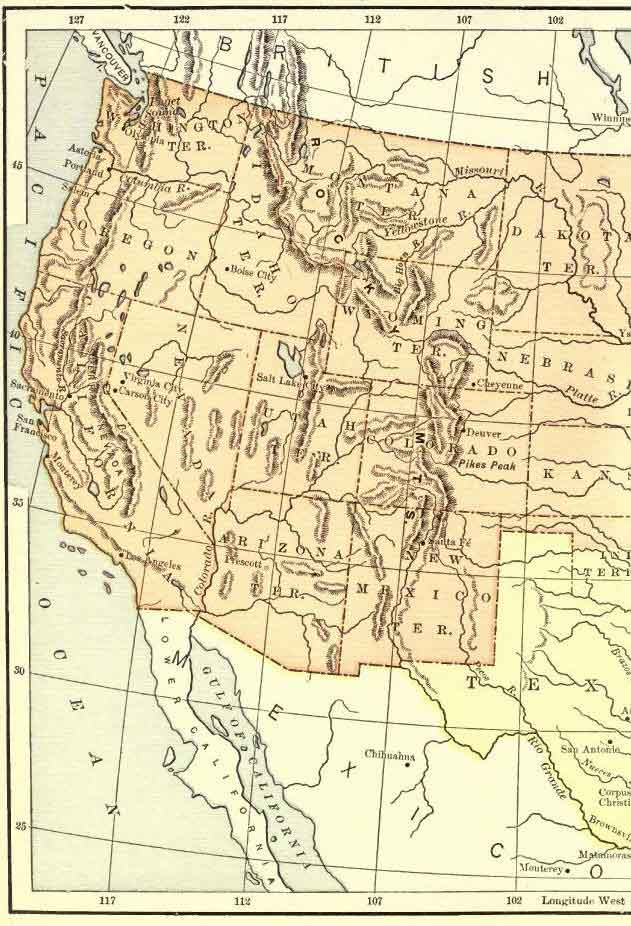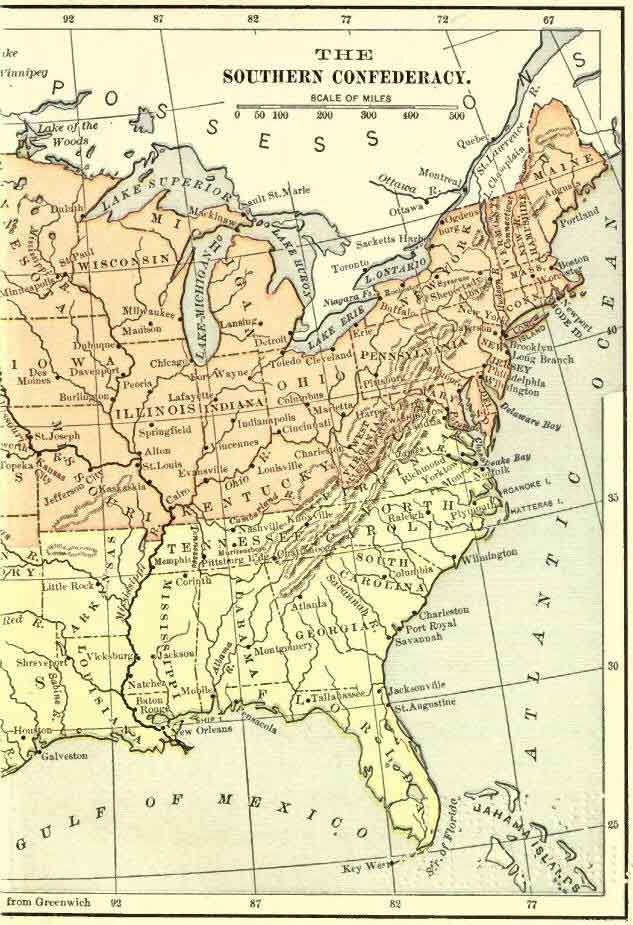1860-1868 Chapter III THE NORTH IN THE WINTER OF 1860-61
CHAPTER III.
THE NORTH IN THE WINTER OF 1860-61
At the beginning of the secession movement the North slumbered and slept. Even South Carolina's withdrawal from the Union caused little alarm. "She will be glad enough to come back before long," prophesied many. As the revolution progressed there was a gradual awakening, but division of opinion paralyzed action. Ultra Abolitionists, with a few others, urged that the South be let go in peace. Most Republicans favored the preservation of the Union by force of arms if necessary; but nearly all Democrats, with many Republicans, wished for compromise. Of the latter class a few prayed the prodigals to return on their own terms. More proposed a rigid enforcement of the fugitive slave law, the repeal of personal liberty legislation, and acquiescence in the Dred Scott decision, with all future like decrees of the Supreme Court.
This may be called the northern-democratic position. The most pronounced Republicans, as Seward and Stanton, would gladly have voted to re-enforce the Constitution's guarantee to slavery in the slave States.
Throughout the North the feeling was strong against all efforts at coercion. Most democratic papers and many republican ones insisted loudly that use of arms was not to be mentioned, and that the South must be conciliated. A democratic convention met at Albany in January, to protest against forcible measures. The sentiment that if force were to be used it should be "inaugurated at home," here evoked hearty response. There were signs of even a deeper disaffection. An ex-governor of New Jersey declared that his State would join the Confederacy. Mayor Wood, of New York, proposed that if the Union were broken up, his city should announce herself an independent republic.
At Washington matters were still worse. President Buchanan, loyal but weak, feared to lift a finger. In his December message to Congress, he insisted that a State had no right to secede, but that the United States had no power to coerce a State which should secede. A majority of his cabinet were southern men, three of them zealous secessionists. His most intimate friends in Congress were southerners. These surrounded the vacillating Chief Magistrate, and paralyzed what little energy was in him, meanwhile taking advantage of his inaction to launch the Confederacy. Now and then, spurred on by loyal old General Scott and by the Union members of his cabinet, the President tried to break away from the toils which the conspirators had spun around him. The Star of the West was secretly sent with supplies and recruits to re-enforce Fort Sumter. But Secretary Thompson warned South Carolina, and when the vessel arrived off Charleston, January 9th, hostile batteries fired upon her and forced her out to sea again.
Another plan to relieve the fort was half formed, but came to nothing. Buchanan's term was on the point of expiring, and he sat supinely looking on while the disruption of the Union proceeded apace.
The northern side in Congress showed little wisdom or spirit. Most northern congressmen truckled to the South or wasted their energies in fruitless attempts at compromise. Both houses, each by more than a two-thirds majority, recommended a constitutional amendment depriving Congress forever of the power to touch slavery in any State without the consent of all the States. In December the venerable Crittenden, of Kentucky, laid before the Senate his famous Suggestions for Compromise. These, besides embodying the above amendment, restored the Missouri Compromise, let each new State decide for itself whether it would be slave or free, and forbade Congress to abolish slavery in the District of Columbia or interfere with the inter-state transportation of slaves.
THE WINTER OF 1860-61 329
The United States was to pay for all fugitives whose capture should be successfully prevented, and slaves as slaves could be carried through free States. This measure, before Congress all winter, was finally lost only for lack of southern votes.
A peace congress, called by Virginia, met at Washington in February. Most of the northern States were represented and all the southern which had not seceded. It sat for three weeks, and adopted resolutions identical in substance with the Crittenden Compromise. These dangerously large offers of concession, mainly well meant, happily proved useless. The South had gone too far. She did not want compromise, but was bent upon setting up a slave empire.
Mr. Lincoln arrived safely in Washington on February 23d, having eluded a rumored plot to assassinate him in Baltimore. He accomplished this by assuming a slight disguise and taking an earlier train than the one in which he had been announced to go.
He was duly inaugurated on March 4th. In his inaugural he disclaimed all purpose to interfere with slavery in the slave States, yet denied the right of secession, and proposed to regain and hold the property and places belonging to the United States in all parts thereof. There would be no bloodshed, he said, unless it were forced upon the Government. "In your hands, my dissatisfied fellow-countrymen," so ran his memorable words, "in your hands, not in mine, is the momentous issue of civil war. You can have no conflict without being yourselves the aggressors. We are not enemies, but friends." This message, held out as an olive branch, the South denounced as a menace. Some northern papers condemned it as the "knell and requiem of the Union." But the general feeling it evoked at the North was one of rejoicing. People believed that a hand both moderate and firm had at length seized the helm.
The new President stood faced by an herculean task. Congress was not yet fully purged of traitors, while Washington still swarmed with their friends and agents. Floyd's treachery had tied Lincoln's hands. All the best munitions of war had been sent south. Of the rifled cannon belonging to the United States not one was left. Only a handful of regular troops were within call, and the resignations of their officers came in daily. The plight of the navy and treasury was no better. Amazing coolness and the absurd prejudice against coercing States largely possessed even the loyal masses. The attack on Sumter was thus a god-send.
April 8th, Governor Pickens received notice from President Lincoln that an attempt would be made to provision that fort. Thereupon General Beauregard, who had left the United States army to take charge of the fortifications at Charleston, was ordered by President Davis to demand its evacuation. Major Anderson replied that they should be starved out by the 15th, and would leave the fort then unless his Government sent supplies. This answer was held unsatisfactory, and at 3.20 on the morning of April 12th Beauregard notified Anderson that his batteries would open fire in one hour.
Fort Sumter stood on an artificial island at the entrance of the harbor. It was pentagonal in shape, the walls of brick, eight feet thick and forty feet high. The parapet was pierced for 140 guns, but only 48 were in condition for use. The garrison, including some 40 workmen and a band, numbered 128. Surrounding the fort on all sides except toward the sea, and distant from 1,300 to 2,500 yards, 19 Confederate batteries were in position, mounting 47 cannon and mortars, and manned by 3,000 or 4,000 volunteers. These works were provided with bomb-proofs made of railroad iron or of palmetto logs and sand.
The wharves, roofs, and steeples of Charleston were black with expectant crowds, straining their eyes down the harbor where the silent castle loomed up through the dim morning light. Boom! From a mortar battery to the south a bombshell rises high into the air, describes its graceful trajectory and falls within Sumter's enclosure.
It is the signal gun. One battery after another responds, until in less than an hour the stronghold is girt by an almost continuous circle of flashing artillery. Shells scream through the air and explode above the doomed work, and great cannon-balls bury themselves in the brick walls. Still Sumter speaks not. Anderson is waiting for daylight. About six o'clock he breakfasts his garrison on pork and water, the only provisions left. An hour later the embrasures are opened, the black guns run out, and Sumter hurls back her answer to the voice of rebellion. The bombs making it unsafe to use the barbette cannons of the open rampart, Anderson was confined to his twenty-one casemate pieces, mostly of light calibre. The fire was kept up briskly all the morning. Sumter stood it well, but did little damage to the opposing batteries. At sunset the guns of both sides became silent, but the mortars maintained a slow fire through the night.
Early next morning the cannonade opened afresh, and in the course of the forenoon hot shot set fire to Sumter's wooden barracks. The flames soon got beyond control; the powder magazine had to be closed; and the heat and smoke became so stifling that the garrison was forced, in order to avoid suffocation, to lie face downward upon the floor, each man with a wet cloth at his mouth. Powder was at last exhausted. About one o'clock the flag was shot away. It was immediately raised again upon a low jury-mast, but could not be seen for the smoke, and Beauregard sent to ask if Anderson had surrendered. The latter offered to evacuate upon the terms named before the bombardment, to which Beauregard agreed, and all firing ceased. The next day at noon, after a salute of fifty guns to their flag, Major Anderson and his men evacuated the scene of their heroism, and soon after took passage for New York.
The disunion leaders had rightly calculated that an open blow would bring the border slave States into the Confederacy; but they had not anticipated the effect of such a deed beyond Mason and Dixon's line. When it was known that the old flag had been fired upon, a thrill of passionate rage electrified the North from Maine to Oregon. Then was witnessed an uprising unparalleled in our history if not in that of mankind. From every city, town, and hamlet, loud and earnest came the call, "The Union must be preserved! Away with compromise! Away with further attempts to conciliate traitors! To arms!" Slavery might do all else, so little did most northerners yet feel its evil, but it could not rend the Union. Pulpit, platform, and press echoed with patriotic cries. Everywhere were Union meetings, speeches, and parades. Union badges decked everyone's clothing, and the Stars and Stripes were kept unfurled as only on national holidays before. In New York City a mass-meeting of two hundred thousand declared for war. The New York Herald changed its sneer to a war-blast. Party lines were thrown down.
Democrats like Butler, Cass, and Dickinson were in the Union van. Senator Douglas, lately Lincoln's antagonist, and at first strongly opposed to coercion, went through the West arousing the people by his patriotic eloquence. "There can be no neutrals now," were his words, "only patriots and traitors."
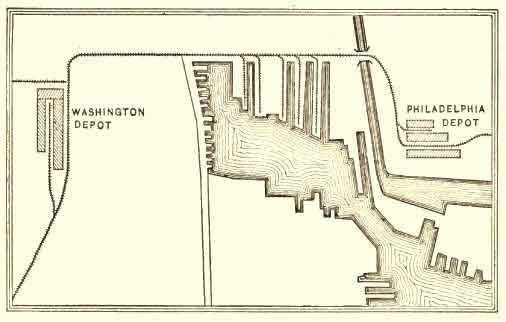
Route of the Sixth Massachusetts Troops through Baltimore.
April 15th, President Lincoln issued a call for seventy-five thousand volunteers, and each free State responded with twice its quota. Enlisting offices were opened in every town and hamlet, and the roll of the drum and the tramp of armed men with faces set southward were heard all over the North. First to march was the Sixth Massachusetts Regiment. Forming on Boston Common it took cars for Washington on April 17th, reaching Baltimore on the morning of the 19th.
Maryland was trembling in the balance between Union and disunion. A determined disunionist minority was working with might and main to drag the State into secession. Baltimore was white-hot with southern zeal, determined that the Bay State troops should never reach Washington through that metropolis. Eight of the cars containing the soldiers were drawn safely across the city. The next was assailed by a hooting mob, and the windows smashed in by bricks and paving stones. Some of the soldiers were wounded by pistol shots, and a scattering fire was returned. Sand, stones, anchors, and other obstructions were heaped upon the track. The remaining four companies therefore left the cars and started to march. They soon met the mob, flying a secession flag.
VOL. III.--22
A melee ensued. The troops moved double-quick toward the Washington depot, surrounded by a seething mass of infuriated secessionists filling the air with their brickbats and stones, while bullets whizzed from sidewalks and windows.
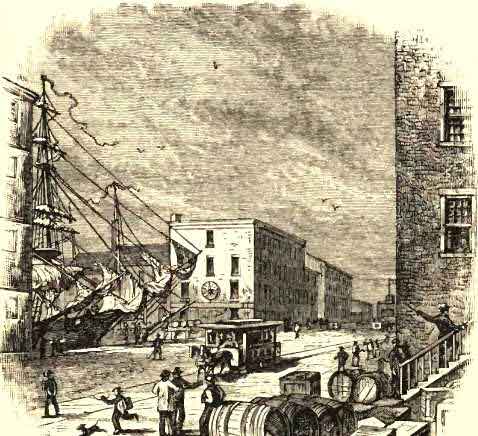
Scene of the First Bloodshed, at Baltimore.
The troops returned the fire, and several in the crowd fell. The chief of police with fifty officers appeared on the scene, who, by presenting cocked revolvers, held the rioters in check for a while, till the distressed troops could join their comrades. Baltimore was in the hands of this secessionist band for the rest of the day. The bridges north of that city were also burned, so that no more troops could reach Washington by this route.
Meanwhile the capital city was in great peril, devotees of the South being each moment expected to make an attack upon it. Only fifteen companies of local militia and six of regulars were present at inauguration time, stationed by General Scott at critical points in the city. Pickets were posted continually on roads and bridges outside. Four hundred Pennsylvania troops happily arrived on April 18th, and the next day came the Sixth Massachusetts. But the city was not yet secure. There were reports that large bodies of men were gathering in Maryland and Virginia for a descent upon it. Washington was put in a state of siege, the public buildings barricaded and provided with sentinels. The Government seized the Potomac steamers and also all the flour within reach.
340 CIVIL WAR AND RECONSTRUCTION
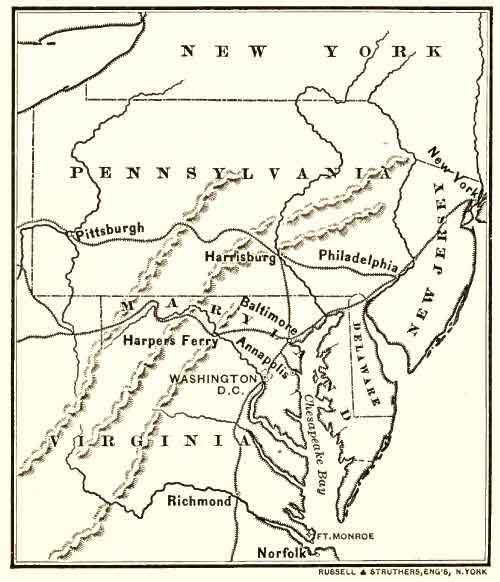
The Routes of Approach to Washington.
Russell & Struthers, Eng's, N. York.
Business ceased. Alarmed by rumors of a military impressment, hundreds of government clerks, besides officers in the army and navy, came out in their true colors and fled south. Enemies at Baltimore had cut off telegraphic communication between Washington and the North. Reports came that re-enforcements were on the way, but day followed day without witnessing their arrival. The President and all Unionists were in an agony of suspense.
On April 22d the Eighth Massachusetts, under General B. F. Butler, and the famous Seventh Regiment from New York City, met at Annapolis. Here they were delayed several days. Governor Hicks had warned them not to land on Maryland soil. The railroad to Washington had been torn up for many miles and the engines damaged. Among his troops Butler found the very machinists who had made the engines. Repairs were promptly effected, the track re-laid, and about noon of the 25th the gallant New Yorkers landed in Washington amid the joyful shouts of the loyal populace.
342 CIVIL WAR AND RECONSTRUCTION
Up Pennsylvania Avenue swept the solid ranks, bands playing and colors flying, to gladden the heart of the careworn President as he welcomed them at the White House. A sudden change came over the city. Secessionists slunk away, the faces of the loyal beamed with joy. The national capital was safe.
